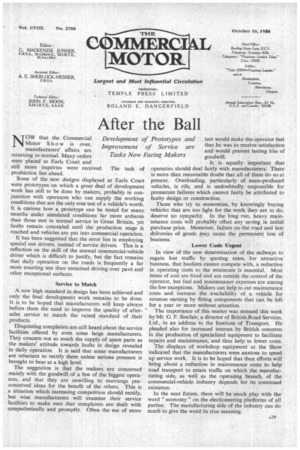After the Ball
Page 31

If you've noticed an error in this article please click here to report it so we can fix it.
NOW that the Commercial Motor Show is over, manufacturers' affairs are returning to normal. Many orders were placed at Earls Court and still more inquiries were received. The production lies ahead.
Tasks
Some of the new designs displayed at Earls Court were prototypes on which a great deal of development work has still to be done by makers, probably in conjunction with operators who can supply the working conditions that are the only true test of a vehicle's worth. It is curious how a prototype can be tested for many months under simulated conditions far more arduous than those met in normal service in Great Britain, yet faults remain concealed until the production stage is reached and vehicles are put into commercial operation.
It has been suggested that the error lies in employing special test drivers, instead of service drivers. This is a reflection on the skill of the normal commercial-vehicle driver which is difficult to justify, but the fact remains that daily operation on the roads is frequently a far more exacting test than sustained driving over pave and other exceptional surfaces.
Service to Match A new high standard in design has been achieved and only the final development work remains to be done. It is to be hoped that manufacturers will keep always before them the need to improve the quality of aftersales service to match the raised standard of their products.
Disquieting complaints are still heard about the service facilities offered by even some large manufacturers. They concern, not so much the supply, of spare parts as the makers' attitude towards faults in design revealed ' in daily operation. It is said that some manufacturers are reluctant to rectify them unless serious pressure is brought to bear at a high level.
The suggestion is that the makers are concerned mainly with the goodwill of a few of the biggest operators, and that they are unwilling to rearrange preconceived ideas for the benefit of the others. This is a situation which increasing competition should rectify, but wise manufacturers will examine their service facilities to make sure that complaints are dealt with sympathetically and promptly. Often the use of more of' Prototypes and tact would make the operator feel of Service are that he was to receive satisfaction and would prevent lasting loss of Facing Makers goodwill.
It I is equally important that operators should deal fairly with manufacturers. There is more than reasonable doubt that all of them do so at present. Overloading, particularly of mass-produced vehicles, is rife, and is undoubtedly responsible for premature failures which cannot fairly be attributed to faulty design or construction.
Those who try to economize, by knowingly buying vehicles that are too light for the work they are to do, deserve no sympathy. In the long run, heavy maintenance costs will probably offset any saving in initial purchase price. Moreover, failure on the road and late deliveries of goods may cause the permanent loss of business.
Lower Costs Urgent In view of the new determination of the railways to regain lost traffic by quoting rates, for attractive business, that hauliers cannot compete with, a reduction in operating costs to the minimum is essential. Most items of cost are fixed and are outside the control of the operator, but fuel and maintenance expenses are among the few exceptions. Makers can help to cut maintenance costs and increase the availability of a vehicle for revenue earning by fitting components that can be left for a year or more without attention.
The importance of this matter was stressed this week by Mr. G. F. Sinclair, a director of BritishRoad Services, Ltd„ in an address to the Institute of Transport. He pleaded also for increased interest by British concerns in the production of specialized equipment to facilitate repairs and maintenance, and thus help to lower costs.
The displays of workshop equipment at the Show indicated that the manufacturers were anxious to speed up service work. It is to be hoped that their efforts will bring about a reduction in maintenance costs to help road transport to retain traffic on which the manufacturing side, as well as the operating branch, of the commercial-vehicle industry depends for its continued existence.
In the near future, there will be much play with the word " economy " on the electioneering platforms of all parties. The manufacturing side of the industry can do much to give the word its true meaning.




































































































